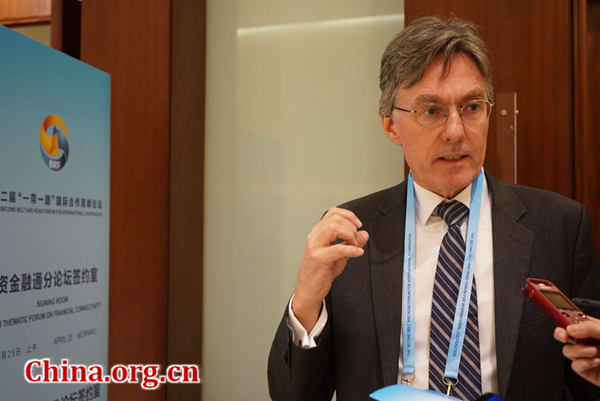?Multilateral development banks key to connectivity: VP of AIIB
- By Zhang Liying
 0 Comment(s)
0 Comment(s) Print
Print E-mail China.org.cn, April 26, 2019
E-mail China.org.cn, April 26, 2019

"Multilateral development banks have played an important role in supporting connectivity projects, and they can play an even more important role in the future," said Joachim von Amsberg, vice president specializing in policy and strategy of the Asian Infrastructure Investment Bank (AIIB).
Speaking Thursday at a thematic forum of the second Belt and Road Forum for International Cooperation, von Amsberg said that multilateral development banks offer decades of experience in two aspects: namely, a firm legal framework for multilateral governance and decision-making, and project implementation that meets international standards on environment, transparency, procurement, anti-corruption and debt sustainability.
It was announced at the forum that the Ministry of Finance of China, together with the AIIB and seven other multilateral development institutions, have established the Multilateral Cooperation Center for Development Finance (MCDF).
As a multilateral platform for infrastructure financing, the MCDF is designed to encourage development banks and other institutions to support infrastructure connectivity through information sharing, project preparation and capacity building, according to China's Minister of Finance Liu Kun.
Von Amsberg said that the MCDF is a timely initiative, as larger investment needs are demanding stronger coordination among stakeholders. By working with and through the development banks, the MCDF will promote a multilateral approach to connectivity initiatives and investments, he said.
In an interview with China.org.cn on the sidelines of the forum, von Amsberg stated that China has set a model for many other countries in the use of domestic infrastructure investment to promote its development.
"I think other countries are studying that model very carefully and looking at how they can replicate China's success in economic development and poverty reduction, in which infrastructure investment has played an important role," he said.
The AIIB can help those countries implement this model by financing stronger infrastructure, von Amsberg added.
As to debt sustainability, a source of worry to some countries, he said that before the AIIB invest, they undertake very careful evaluation of the potential project.
"We analyze whether the finances of the project are sound and whether the project generates the revenue necessary to pay back the loan; we analyze the economic impact of the project, making sure that it's a good project for the country," von Amsberg said.
He also emphasized the importance of transparency, saying that the public should know what projects are being carried out, and who is financing them and carrying them out.
Asked about the focus of the AIIB's future work, von Amsberg cited sustainable infrastructure, cross-country connectivity and the mobilization of private capital as their three overarching priorities.
"We want to help our countries achieve environmentally sustainable development, reduce carbon emissions and build sustainable cities," he explained.
Von Amsberg said that transport, energy and data links between countries require investment and coordination, so the AIIB, as a multilateral development bank, focuses particularly on the projects that connect countries and help with trade growth and economic development.
Private capital is also needed to meet the enormous infrastructure finance needs, and the AIIB aims to attract private capital to complement public financing, he added.





